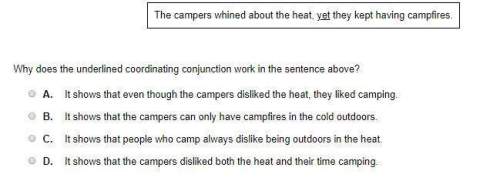An appeal to emotion affects the audience by
Select one:
explaining the significance of...

English, 19.05.2020 15:13 kaylallangari1509
An appeal to emotion affects the audience by
Select one:
explaining the significance of moral arguments.
O
covering up a lack of logic and coherence in the argument.
O upsetting the audience and distracting them from the issues.
making them feel what the speaker desires them to.

Answers: 1


Other questions on the subject: English


English, 21.06.2019 21:30, coreybro
Read the excerpt from julius caesar, act 1, scene 1. marullus. wherefore rejoice? what conquest brings he home? what tributaries follow him to rome to grace in captive bonds his chariot wheels? you blocks, you stones, you worse than senseless35 things! o, you hard hearts, you cruel men of rome, knew you not pompey? many a time and oft have you climbed up to walls and battlements, to towers and windows, yea, to chimney-tops, your infants in your arms, and there have sat40 the livelong day, with patient expectation, to see great pompey pass the streets of rome. which summary of the passage is the best? marullus asks a lot of questions, such as, “why celebrate? what has caesar done? who is following him to rome? don’t you remember pompey? ” then he says that everyone is cruel because they do not remember pompey. they forget how they praised him and would climb to the highest places, carrying their children, just to catch a glimpse of him. marullus regrets that the people are celebrating caesar and is insulted that they forgot how they used to praise pompey. marullus thinks that the people should celebrate caesar the way they used to celebrate pompey, and that they should be in awe of caesar’s greatness. marullus remembers how the people climbed walls, battlements, towers, windows, and even chimney tops to see the great pompey.
Answers: 1

English, 22.06.2019 01:10, tasha7121
Read this excerpt from mohandas gandhi's "banaras hindu university speech." what is the speaker's purpose a. to persuade his audience to struggle for self-governance through peaceful means b. to urge wealthy indians to act instead of merely talk about poverty c. to inform the audience that the british colonial power is stealing indian resources d. to persuade his audience to renounce materialistic wealth and pursue spiritual wealth
Answers: 1

English, 22.06.2019 06:40, autumnlyons69
Activity construct an argument about a topic, theme, or idea that you read about in william shakespeare's romeo and juliet, act ii or act iii. make sure you create a central claim for your argument that is debatable. provide textual evidence from the play to support your argument. here are some ideas for your essay. notice how each topic is focused and specific. you may write about one of these topics or choose your own focused and specific topic: discuss juliet's level of maturity and compare it to romeo's. compare how the two characters react to the events after their marriage, when romeo is banished from verona. discuss the balcony scene. does the knowledge of romeo and juliet's final fate influence the meaning of the balcony scene or the audience's interpretation of it? discuss the characters of tybalt and romeo as they relate to the theme of family and the theme of love. explain how the character of tybalt develops the theme of family and how the character of romeo develops the theme of romantic love. discuss the character of friar laurence. what motivates him to romeo and juliet to defy their parents? part a choose a topic based on what you read in act ii or act iii of romeo and juliet. then write a thesis statement. part b identify two or three short excerpts from the play as textual evidence to support your thesis statement. part c write a 300-word essay arguing the thesis of your analysis. (i mainly need on part b and c)
Answers: 1
You know the right answer?
Questions in other subjects:




Social Studies, 27.09.2019 12:00

History, 27.09.2019 12:00


Mathematics, 27.09.2019 12:00






